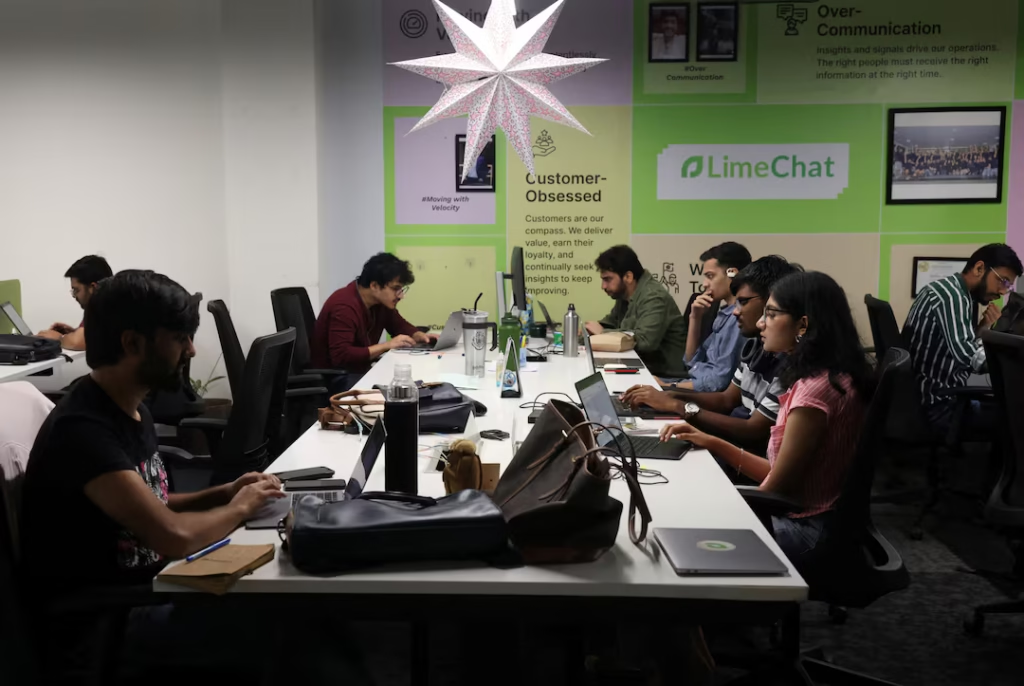
Bengaluru-based conversational AI unicorn LimeChat is spearheading a paradigm shift in India’s customer service landscape with its advanced generative AI systems, capable of autonomously resolving up to 95% of customer queries. Founded in 2019 by IIT Delhi alumni Deepak Gupta (CEO) and Shivam Gupta, the startup is positioned to disrupt the $20+ billion Indian BPO industry, offering e-commerce brands like Mamaearth, Kapiva, BlueTokai, and Planet54 a scalable, cost-effective alternative to traditional call centers.
Powered by Microsoft Azure and GPT models, LimeChat’s Level-3 AI chatbots already handle 70% of customer complaints for its clients, with a clear roadmap to achieve near-total automation within the next year.
How LimeChat’s AI Technology Works
Level-3 AI Chatbots: Beyond Basic Automation
- Contextual Understanding: Interprets nuanced customer intent and history
- Generative Responses: Creates human-like, personalized replies in real time
- Multi-Turn Conversations: Manages complex dialogues spanning multiple queries
- Seamless Escalation: Transfers unresolved issues to human agents with full context
Omnichannel Deployment
- WhatsApp, Instagram, Websites, and Apps: Unified AI presence across platforms
- Continuous Learning: Improves accuracy using interaction data and feedback loops
- Sales & Support Integration: Converts service queries into purchase opportunities
Business Impact: Efficiency and Cost Savings
Operational Metrics
- Workforce Reduction: Cuts staffing needs by 80% for handling 10,000 monthly queries
- Monthly Cost: As low as $1,130—equivalent to three human agents
- Resolution Rate: Target of 95% fully automated resolutions
- Response Time: Near-instant replies, 24/7 availability
Performance Improvements
- 10% Increase in Sales Conversions through personalized cross-selling and upselling
- Higher Customer Satisfaction via consistent and accurate support
- Scalability: Effortlessly handles seasonal spikes and business growth
Growth and Market Traction
Financial Momentum
- 2022 Revenue: $79K
- 2024 Revenue: $1.5M
- Primary Clients: E-commerce, D2C, and FMCG brands
Investor Backing
- Lead Investor: Titan Capital
- Funding Utilization: Product enhancement and global market expansion
Industry Context: Reshaping the BPO Sector
The $20B+ Indian BPO Industry at a Crossroads
- Labor-Intensive Model: Traditionally reliant on large human teams
- Rising Costs: Salaries, infrastructure, and attrition driving expenses upward
- AI Disruption: Technologies like LimeChat offering efficient and affordable alternatives
Competitive Landscape
- Reliance Haptik: Reporting 30% cost reductions for enterprise clients
- Other Players: Verloop, Senseforth, and Yellow.ai
- LimeChat’s Edge: Specialization in e-commerce and D2C segments
Leadership Vision
Deepak Gupta, Co-founder & CEO
Broader Implications
For the Indian Economy
- Job Transformation: Shift from repetitive tasks to higher-value roles in AI training and supervision
- SMB Empowerment: Affordable automation helping small businesses compete with giants
- Global Opportunities: Potential for Indian AI solutions to be exported worldwide
Alignment with National Initiatives
- IndiaAI Mission: Fostering homegrown AI innovation and adoption
- Atmanirbhar Bharat: Showcasing Indian tech prowess and self-reliance
- Digital India: Enhancing digital customer service infrastructure
Implementation and Use Cases
E-commerce & D2C Brands
- Order Tracking: Real-time updates without agent intervention
- Returns & Refunds: Automated processing based on policy rules
- Product Recommendations: Personalized suggestions during support interactions
Emerging Applications
- Banking & Finance: Balance inquiries, transaction disputes, and fraud alerts
- Telecom: Plan upgrades, billing issues, and network troubleshooting
- Healthcare: Appointment scheduling, medication reminders, and basic diagnostics
Challenges and Ethical Considerations
Adoption Barriers
- Customer Trust: Some users still prefer human interaction for complex issues
- Integration Complexity: Connecting with legacy CRM and ERP systems
- Data Privacy: Ensuring secure handling of sensitive customer information
Workforce Impact
- Reskilling Needed: Transitioning agents from repetitive tasks to AI supervision
- New Roles: Emergence of positions like AI trainers and conversation designers
- Regional Considerations: Balancing automation with employment in BPO hubs
Future Roadmap
Short-term (2025)
- Achieve 95% automated resolution across all clients
- Expand into Southeast Asian and Middle Eastern markets
- Launch industry-specific AI models for banking and healthcare
Long-term (2026-2027)
- Develop multilingual capabilities for Indian regional languages
- Integrate voice-based AI interactions
- Establish predictive customer service using advanced analytics
Conclusion: The Future of Customer Service is Automated
LimeChat’s rapid ascent demonstrates how AI is fundamentally transforming customer service from a cost center to a strategic advantage. By automating routine queries while maintaining—and often enhancing—the customer experience, the startup is helping Indian businesses become more efficient, scalable, and competitive.
The implications extend far beyond cost savings:
- Democratizing Quality Support: SMBs can now offer service levels previously only affordable for large enterprises
- Human-AI Collaboration: Agents freed from repetitive tasks can focus on complex, high-value interactions
- Global Benchmark: Indian AI innovation setting standards for customer service worldwide

